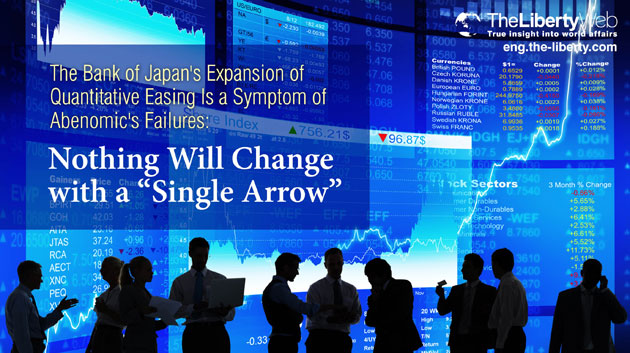The Bank of Japan’s Expansion of Quantitative Easing Is a Symptom of Abenomic’s Failures: Nothing Will Change with a “Single Arrow”
The Bank of Japan recently announced the first expansion to its Quantitative Easing program since April 2013, but there are questions surrounding its effectiveness.
The Bank of Japan adds liquidity to the markets by buying bonds from private entities such as banks. Until recently, the pace of the asset-purchase program was 60-70 trillion yen per year, but the latest move will accelerate this purchase rate to 80 trillion yen. The sudden move took the world by surprise, and pushed international markets higher.
But this isn’t necessarily good news.
The latest easing is designed to be a follow-up to the ongoing QE program that hasn’t had the expected effect, resulting in the need for an emergency loosening of policy. The September inflation rate stood at 1% (excluding food prices and the effects of the sales tax increase), which comes nowhere close to the 2% target rate.
The real economy is also in trouble. The Ministry of Internal Affairs and Communications’ September survey reported that per capita spending decreased at an annualized rate of 5.6%. This was the 6th consecutive month of declines, and the decline is accelerating. Individual wages also fell by 6% in September, which was the 12th consecutive month of declines. The Ministry of Health, Labor, and Welfare showed a deteriorating job vacancy rate in September, with unemployment rising for the first time in two months to 3.6%.
However, these results could have been, and in fact were, foreseen beforehand.
Master Ryuho Okawa of Happy Science stated in January of this year that Abenomics “was very close to succeeding”, but in fact should be declared a “failure” (see “Business Strategy in an Era of Perseverance”).
The primary reason for its failure was the increase in the sales tax, which prompted private businesses and individuals to begin preparing for the decline in demand. Even if the BOJ were to inject liquidity to persuade the public to spend money, private companies can’t borrow out of fear of a deteriorating business climate. This also means that private banks will be hesitant to provide loans out of fear of default.
The latest round of QE will likely end with the same result. Further sales tax increases are coming in an environment where the negative effects of such an increase is now widely acknowledged by the public. Even if the increase is delayed, an eventual sales tax increase will arrive just in time to break an improving economy. Economic conditions show no signs of improving for some time, and businesses are becoming defensive by refraining from borrowing money.
The economic statistics above show clearly the magnitude of the damage caused by the sales tax increase before Abenomics could begin improving the real economy. For now, Quantitative Easing is the “only arrow” from Abenomics that has had a noticeable effect on markets. However, it is clear that that alone will not improve the conditions found on “Main Street”. It seems that Prime Minister Abe needs to have another look at his own economic policy.



















